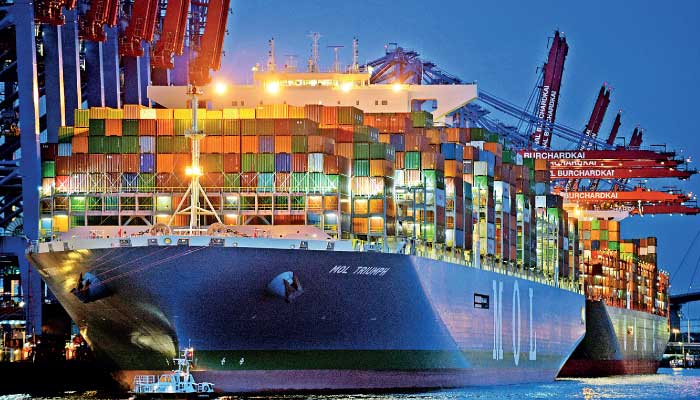Sunday Feb 22, 2026
Sunday Feb 22, 2026
Saturday, 5 March 2022 00:00 - - {{hitsCtrl.values.hits}}

A new study conducted by the Institute of Policy Studies of Sri Lanka (IPS) offers empirical evidence that the gains from a preferential trade agreement between Bangladesh and Sri Lanka are modest and calls for a trade deal without the weaknesses in existing regional trade agreements. The study entitled ‘Trade Policy Effects on Global Value Chain Participation of South Asian Countries: Implications for Bangladesh-Sri Lanka Trade Negotiations’ is authored by Asanka Wijesinghe and Chathurrdhika Yogarajah.
The IPS study uses disaggregated export data into GVC components to identify the impact of tariffs and existing trade agreements in the South Asian region on trade. The gravity estimates show that the current level of tariffs hurt gross exports and GVC components of exports. In the food sector, border tariffs negatively affect the intermediate exports that will be processed and re-exported by the importing country. Notably, mixed results are obtained for the effect of RTAs.
When allowed to adjust trade costs by estimating the gravity models with data in intervals, a weak statistically significant positive impact of RTAs on intermediate agricultural exports is evident.
However, the effect of RTAs is strongly negative on all the components of food exports. The RTA effect is weakly significant and negative on GVC components of total trade. The study results imply an offsetting impact of general regulatory measures attached to the trade agreements. Thus, a future PTA between Bangladesh and Sri Lanka should have minimum regulatory measures – rules of origin (ROOs), sensitive lists, prolonged phasing-in – to achieve the agreement’s full potential.
The study also simulates the potential trade gains from eliminating the sensitive lists between the two countries under the South Asian Free Trade Area (SAFTA). The complete removal of the sensitive lists will generate 35% and 47% of additional exports for Bangladesh and Sri Lanka, respectively. However, the absolute value of exports – $ 2.1 million for Bangladesh and $ 24.5 million for Sri Lanka – is modest due to the low bilateral trade volume. Importantly, it will not be feasible to altogether remove sensitive lists due to political and revenue reasons. In addition, being a least developed country, Bangladesh may expect special provisions. Thus, the study identifies products that would maximise trade gains from partial tariff elimination in the final step.
Policy implications
This IPS study implies that future trade agreements should be sans complex ROO, long sensitive lists, and prolonged phasing-in. In addition, general tariff cuts, instead of preferential tariff cuts, may generate higher trade gains. Significantly, the modest economic benefits from the complete removal of the sensitive lists weigh down on the economic rationale of a PTA. In addition, political and revenue reasons might reduce the scope and depth of a PTA. Thus, the study calls for selective negotiations for removing tariffs on intermediate goods such as dyed cotton and fabrics; cartons, boxes, and cases; plain woven fabrics of cotton; denim; natural rubber; and smoked sheets of natural rubber.
The rationale for this approach is that the comparative advantage of both countries lies in the finished products that embed these intermediate products. A PTA can develop value chain participation utilising the scale economies and factor cost advantages.
(The full report can be accessed at:
https://www.ips.lk/trade-policy-effects-on-global-value-chain-participation-of-south-asian-countries-implications-for-bangladesh-sri-lanka-trade-negotiations/.)